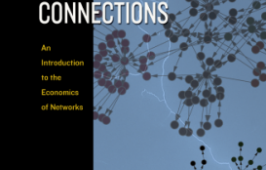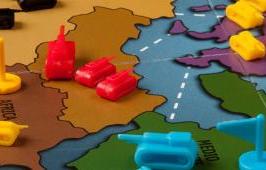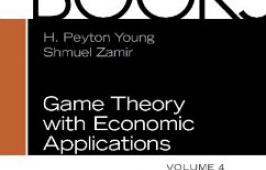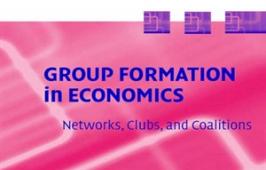Network Games
Many decisions that individuals make are influenced by the choices of their friends and acquaintances. For instance, the decision of an individual about whether or not to buy a new product, attend a meeting, commit a crime, find a job, exchange or trade, is often influenced by the decisions of his or her friends and acquaintances. Network games use game theory to analyze the interactions of individuals who are connected via a network and whose behavior is influenced by their neighbors, since the payoffs that individuals obtain from various decisions depend on the behavior of their neighbors. In particular, network games study the impact of the structure of the (complex) network on individuals' behavior.
Related posts
|
Article Competition between two-sided platforms is shaped by the possibility of | READ MORE ... |
Article The stability of Nash equilibria has often been studied by examining the | READ MORE ... |
Book Networks pervade social and economic life, and they play a prominent role in | READ MORE ... |
|
Working paper We assess systematic risk in the U.S. banking system before and after the Panic | READ MORE ... |
Article We introduce the concept of a horizon-K farsighted set to study the influence | READ MORE ... |
Working paper We consider a network game with local complementarities. A policymaker, aiming | READ MORE ... |
|
Article We study a local public good game in an endogenous network with heterogeneous | READ MORE ... |
From theory to application . |
Working paper This paper analyzes farsighted stable sets when agents have heterogeneous | READ MORE ... |
|
Working paper We study stable sets for marriage problems under the assumption that players | READ MORE ... |
Working paper The paper defines a family of nested non-cooperative simultaneous finite games | READ MORE ... |
From theory to application .
|
|
Working paper We study the value of network information in a context of monopoly pricing in | READ MORE ... |
Article We generalize the characterizations of the positive core and the positive | READ MORE ... |
Article With a laboratory experiment, we study the impact of buy-options and the | READ MORE ... |
|
Working paper A principal offers bilateral contracts to a set of agents organized in a | READ MORE ... |
Article Using data generated by extensive simulations of a process where individuals | READ MORE ... |
Book The Oxford Handbook of the Economics of Networks represents the frontier of | READ MORE ... |
|
Working paper The purpose of this paper is to analyze the effects on the Italian directorship | READ MORE ... |
Working paper This chapter studies games played on fixed networks. These games capture a wide | READ MORE ... |
Working paper We model a bipartite network in which links connect agents with public goods. | READ MORE ... |
|
Book "A beautiful dozen. Twelve papers presented in 20 years of meetings of the | READ MORE ... |
From theory to application It is well known that some diseases have a genetic origin, often originated by | READ MORE ... |
Article We study network games under strategic complementarities. Agents are embedded | READ MORE ... |
|
Blog This blog offers an interesting view on sports and their statistical and | READ MORE ... |
Interview During the 19th CTN Workshop, organized jointly by CORE (Université catholique | READ MORE ... |
New book The ability to understand and predict behavior in strategic situations, in | READ MORE ... |
|
Article This paper analyzes the effects of the co-authorship and bibliographic coupling | READ MORE ... |
Working paper We elicit reciprocal preferences in a firm-worker gift-exchange setting and | READ MORE ... |
Working paper We generalize the characterizations of the positive core and the positive | READ MORE ... |
|
Working paper We consider a Hotelling game where a finite number of retailers choose
a | READ MORE ... |
Book Broad and diverse ranges of activities are conducted within and by organized | READ MORE ... |
Article Geography and social links shape economic interactions. In industries, schools | READ MORE ... |
|
Working paper We consider a game of information transmission, with one informed decision | READ MORE ... |
Working paper Many types of economic and social activities involve significant behavioral | READ MORE ... |
Working paper We put forward a model of private goods with externalities. Agents derive | READ MORE ... |
|
Working paper This paper studies a model of diffusion in a fixed, finite connected network. | READ MORE ... |
Working paper A local public-good game played on directed networks is analyzed. The model is | READ MORE ... |
Working paper Which types of networks favor the diffusion of innovations in the sense that an | READ MORE ... |
|
Working paper We examine how three different communication processes operating through social | READ MORE ... |
Working paper In this paper, we consider the competition of providers of information products | READ MORE ... |
Working paper We develop a social network model of occupational segregation between different | READ MORE ... |
|
Working paper A tragedy of the commons appears when the users of a common resource have | READ MORE ... |
Working paper We analyze a model of price competition Ü la Bertrand in a network environment | READ MORE ... |
Working paper Delayed perfect monitoring in an infinitely repeated discounted game is | READ MORE ... |
|
Working paper In this paper we study three different types of loss aversion equi- libria in | READ MORE ... |
Working paper A firm sets up a network of information generating alliances to reduce | READ MORE ... |
Working paper We present a model of labor markets that accounts for the social network | READ MORE ... |
|
Working paper Criminals are embedded in a network of relationships. Social ties among | READ MORE ... |
Working paper This paper provides a simple matching model in which unemployed workers and | READ MORE ... |
Working paper We propose a stylized model of a problem-solving organization whose internal | READ MORE ... |
|
Working paper Network structures play an important role in many economic situations. The | READ MORE ... |
Working paper I survey the recent literature on the formation of networks. I provide | READ MORE ... |
Working paper We develop a model where agents obtain information about job opportunities | READ MORE ... |
|
Working paper |
Working paper In the literature various models of games with restricted cooperation can be | READ MORE ... |







